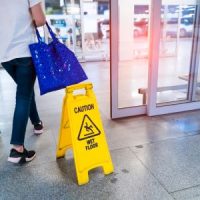How Often Does A Store Have To Inspect Or Clean Its Floors?

If you fall on something on a store’s floor, your first reaction may be that the store should have cleaned their floors more often. However, rarely does a major store fail to ever clean or inspect their floors—most have some system to keep their areas clean.
That leads to the question of how much is enough—that is, how much does the typical store have to clean, or at least inspect its floors, and how little is too little?
No Solid Answers
There is no one definite answer, and the answer will depend on the circumstances. One easy answer may be that a store has to clean or inspect its floors as often as is needed—although that hardly gives people much guidance.
The real question to ask is when would a reasonable person (or store) clean or inspect its floors. Of course, the answer to this depends on a number of factors.
The Type of Store Matters
One main factor is what kind of store it is, which is related to how busy the store is. A grocery store would need more routine inspections than, say, a luxury department clothing store. The grocery store simply has more foot traffic than the clothing store.
Another factor is what does the store sell? A spill is always more likely in a grocery store, where items are small, young kids handle items, items are tightly packed on the edge of shelves, and items are filled with liquids that, if they fall and are broken, can cause an immediate hazard.
Temporary factors can play into the analysis as well. A grocery store may not need to inspect as often at 10pm on a Tuesday night as it would have to do the day before Christmas, when the place is mobbed and very frenetic.
Knowledge and Routine Inspections
A store is not charged with immediate knowledge of a dangerous condition. However, it cannot purposely fail to inspect its floors, in order to remain blissfully ignorant of a dangerous condition so that it can later say “we didn’t know it was there,” when you fall over something.
If something falls, and is on the floor for 30 seconds before you fall on it, the store may not be liable, as there is no way for a store to inspect its entire floor every 30 seconds.
But extend that time to 1, 2, or 10 minutes, and the longer you go, the more likely it is that a store should have had someone monitoring, inspecting or cleaning.
Things like pictures, videos and eyewitness testimony, can often help determine how long something was left on the floor before a victim falls on it—the longer it remained there, the more likely it is that the store was negligent.
Have you been injured in a slip and fall accident? Call the Clinton personal injury lawyers at Fox Farley Willis & Burnette, today.
Sources:
justia.com/injury/premises-liability/defenses-in-slip-and-fall-cases/
nfsi.org/nfsi-research/quick-facts/
